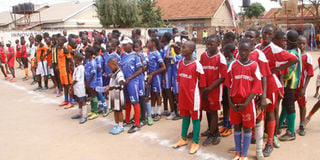Sports kicks life into education in slums

Children from Kamwokya and Kyebando slums get ready for a football tournament last week. PHOTO BY Abubaker Lubowa
What you need to know:
- Believed to be a hub of criminal gangs, Kamwokya is slowly transforming into home of youth using football to stay in school and enhance discipline.
Nine-year-old Christine Uwimana is a Primary Three pupil of KCCA Primary School in Kamwokya and a resident of Kifumbira Zone. She had a childhood faced with adversity and had even dropped out of school. She recalls when a teacher embarrassingly threw her out of class because she had not yet paid school fees.
“I had sat for the first three papers of Primary Three second term exams however, as I was going to sit for Mathematics, the teacher came and threw me out of the examination when I had only done two numbers,” Uwimana narrates sadly. She says the teacher loudly told the whole class how “this girl’s father” did not want to pay school fees, unceremoniously sending her home.
Meanwhile, her friends had started playing football with a team working with Right to Play, so, every time, they went to play football, she followed them. “My three elder brothers play football (from different teams). They were talented but I was not but I told my friends that I also wanted to play football,” Uwimana recalls.
Her friends took her to the coach who allowed her to join the team thus getting into with Right to Play. “I started playing football taking part in tournaments. Right to Play would give us equipment such as balls, jerseys and everything else we needed,” she says.
Learning through play
Right to Play is a non-governmental organisation that believes that children learn through play.
They use the power of play to educate and empower children to overcome the effects of poverty, conflict and disease in disadvantaged communities. And that whereas food, water and shelter are essential, so is a childhood, complete with education and opportunities.
And indeed Uwimana says she is happy to be back in school as well as get life skills. “Apart from teaching us how to play professional football, we learn life skills such as communication, teamwork and discipline,” she says.
Rehabilitation
For Swaib Kwiha, 14, Right to Play has in addition to educating him transformed him into a better person. With his parents separated; the mother in Mubende and Kwiha living with his father in Kamwokya, he was left no option but fend for himself.
“My father had his own problems, so often I went without food and I could move around looking for scrap which I sold to get something to eat. In the night, I would not sleep home but would spend the night with other boys in makeshift film halls,” Kwiha says.
Though he played football once in a while at TLC pitch, the company he kept took him to the wrong path. “One day the coach called me and counselled me about my behaviour. With time, I left home and started living with him,” he narrates.
He emphasises that he has now seen how football is important and how it can help him in the future.
“I would not have studied from Primary Five to Senior Three,” Kwiha a Senior Two student at St. John’s Secondary School in Mukono confesses.
“Many young boys we play with used to be arrested those days – because they were found moving in the night. I also used to do such but because we have been trained to behave not just on the field but everywhere I nolonger get into trouble,” he says.
Under their Tusobola project, Right to Play operates with more than 3, 000 children from the slums of Kamwokya and Kyabando in Kampala between the age of 6 and 18. They collaborate with primary schools and community based schools and skills centres.
The Right to Play executive director, Evelyn Aguti, says out of the children, 50 per cent of them are girls and this gives an equal opportunity to both sexes.
“We see many children in slums becoming criminals after dropping out of school. We believe it is through sports that we can bring them together and make sure they are empowered and encouraged to get back to school or in technical institutions where they acquire skills,” she says.
Last week the youths showcased their football and life skills during a football tournament at TLC grounds in Kamwokya.
Kamwokya is well-known as home to underprivileged families and drug and criminal gangs. But with the vision of Right to Play, this may soon be over.




